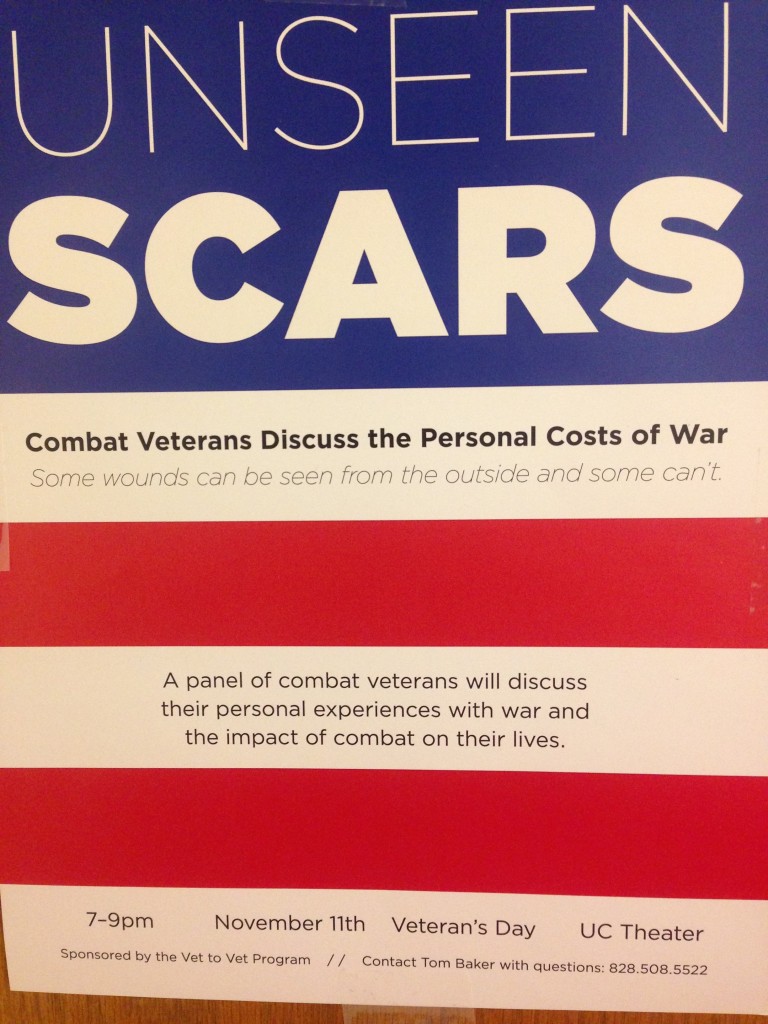Originally published in the Western Carolinian
Unseen Scars, an event to break the stigma of what veterans go through and to raise awareness of the mental health resources that veterans need, was hosted on Nov. 9 in the UC Theater.

Student Veterans Association (SVA), the WCU Military Services and DegreePlus hosted this event where a panel of veterans talked about their experiences and the effect their service has on them to this day. For privacy reasons and out of respect for these veterans, the Carolinian will leave out their names.
At WCU, the SVA provides assistance for student veterans whether that be accommodations, academic support, paperwork or a safe space amongst other veterans. The organization holds the event annually.
Unseen Scars
During the event, a poster hung saying the words ’22 veterans a day take their lives’.
Opening speaker Tom Baker who is president of the Jackson County Veterans Organization, told the room that many see and hear the figures but don’t see the value or the people.
Throughout the event, each veteran told their story and what they have been dealing with since their time in combat. Many talked about how hard it is to get help for fear of being seen as weak or they don’t want to acknowledge something is wrong. The panel gave advice and support to the veterans out in the audience.
One female veteran goes to a female veteran support group and loves trying different outdoor activities to make herself stay busy. Another veteran is a part of the SVA and said the members really helped him figure out what was next.
Nicholas Fedor, president of SVA, was on the panel. After talking about his experience, he mentioned that the SVA has been a great resource for him and has helped him through his mental health as well as adapting to life outside of combat.
“Every experience in military, it can effect everybody in a different way through anger, substance, or depression,” one veteran said. He urged the audience to go talk to someone, even if you are hesitant and scared because it is better to talk to someone than to keep all of those emotions trapped inside.
The panel also discussed the way others can advocate or have these conversations with veterans. People do not have to walk on eggshells or avoid the subject, instead be forward and respectful because you never know what that person has been through.
The Unrecognized Veteran Effect
In an interview with the Carolinian, Fedor discussed how it can be hard getting help depending on the area you live in or if the VA is able to get into contact with you.
The U.S. Department of Veterans Affairs (VA) did a study in 2020 with the findings that 6,146 veterans took their lives. According to the U.S. Census Bureau, veterans make up around 7% of the U.S. population.
“22 a day from 7% population is that main kind of focus point…people need to realize what exactly is going on here in this nation. When it comes to other states… they are not getting the same support as they are out here…I come from Atlanta. It was absolutely horrible. I couldn’t even get anybody to return my calls …when I came up here, I actually found somebody who sat there and she walked me through the entire process,” Fedor explained.
Fedor got out in 2018 but finally got the help he needed in 2021. He explained how this didn’t happen to just him but happens to veterans all around the nation. He calls this the “unrecognized veteran effect” where many veterans wait forever to get help or may never get the help they need. This plays a factor in the high suicide rates.
Resources for Veterans
“Here at Western, I feel like we got a good spread of support… but you know when it comes to medical care…mental health, just the rest of life is where we are severely having some troubles on where exactly those resources are,” said Fedor. He recommended the Asheville VA since it is one of the best across the nation.
Next, Fedor talked about military student services coordinator Briana Ford who schedules trips for people from the VA so the SVA can talk to social workers about what they can do for things like medical care and mental health. There is also the Veteran’s crisis line through the VA.
“The other thing that I’ve really been trying to push into the club here is the ‘IGY6 mentality’ that we should have for each other,” explained Fedor. The IGY stands for “I got your” and the six is a military phrase for back, which combined means “I got your back.”
One of the biggest tools that Fedor mentioned was relying on one another because other veterans understand the struggles and have been through similar things. In the new year, the SVA will be working on their outreach and their funding in order to have more events for student veterans.
“We’re really trying to put ourselves… we’re here trying to make a statement saying like ‘hey we’re part of this population too and we are amongst you… we’re here in the same classes as you are whether you know it or not,” Fedor declared.
To learn more or to join the SVA, contact jpjustice3@catamount.wcu.edu.


